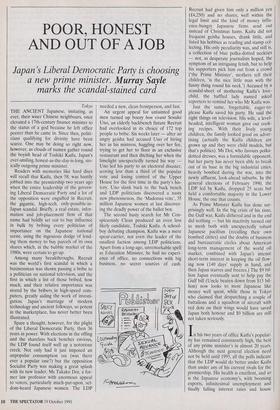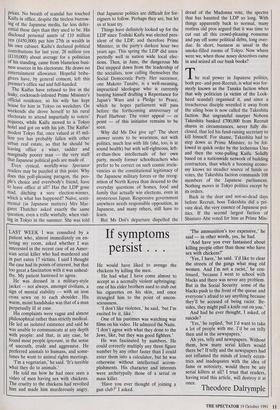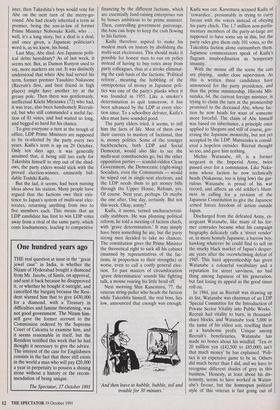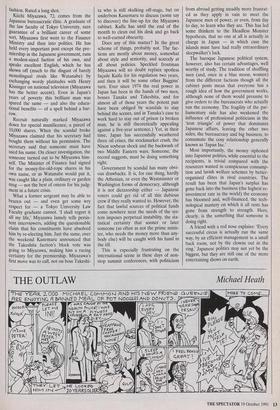POOR, HONEST AND OUT OF A JOB
Japan's Liberal Democratic Party is choosing
a new prime minister. Murray Sayle
marks the scandal-stained card
Tokyo THE ANCIENT Japanese, imitating, as ever, their wiser Chinese neighbours, once elevated a 17th-century finance minister to the status of a god because he left office poorer than he came in. Since then, politi- cians qualifying for divinity have been scarce. One may be doing so right now, however, as clouds of numen gather round the boyish head of Toshiki Kaifu, Japan's ever-smiling, honest-as-the-day-is-long, sto- ically outgoing prime minister.
Readers with memories like hard discs will recall that Kaifu, then 58, was hastily jobbed into the premiership two years ago when the entire leadership of the govern- ing Liberal Democratic Party and a lot of the opposition were engulfed in Recruit, the gigantic, high-tech, only-possible-in- Japan scandal. Briefly, a real estate, infor- mation and job-placement firm of that name had boldly set out to buy influence in bulk by bribing every politician of importance on the Japanese national scene, using the ingenious dodge of lend- ing them money to buy parcels of its own shares which, in the bubble market of the 1980s, were certain to go up.
Among many breakthroughs, Recruit was the world's first scandal in which a businessman was shown passing a bribe to a politician on national television, and the first in which a list of those bribed, how much, and their relative importance was stored by the bribers, in high-speed com- puters, greatly aiding the work of investi- gation. Japan's marriage of modern technology and ancient folkways, so potent in the marketplace, has never better been illustrated.
Spare a thought, however, for the plight of the Liberal Democratic Party, then 36 years in power. With elections in the offing and the shareless back benches envious, the LDP found itself well up a notorious creek. Not only had it just imposed an unpopular consumption tax (was there ever a popular one?) but the opposition Socialist Party was making a great splash with its new leader, Ms Takako Doi, a for- mer law professor with enormous appeal to voters, particularly much-put-upon, sel- dom-heard Japanese women. The LDP needed a new, clean frontperson, and fast.
An urgent appeal for untainted good men turned up boozy bon vivant Sosuke Uno, an elderly backbench fixture Recruit had overlooked in its choice of 172 top people to bribe. Six weeks later — after an angry geisha had accused Uno of hiring her as his mistress, haggling over her fee, trying to get her to floor in an exclusive restaurant and then ditching her when the limelight unexpectedly turned his way — Uno led his party to an electoral disaster, scoring less than a third of the popular vote and losing control of the Upper House for the first time in the party's his- tory. Uno slank back to the back bench and LDP politicians discovered a nasty new phenomenon, the 'Madonna vote', 35 million Japanese women at last discover- ing the deadly power of the ballot box.
The second hasty search for Mr Con- spicuously Clean produced an even less likely candidate, Toshiki Kaifu. A school- boy debating champion, Kaifu was a mere spear-carrier, not even the leader of the smallest faction among LDP politicians. Apart from a long-ago, unremarkable spell as Education Minister, he had no experi- ence of office, no connections with big business, no secret sources of cash. Recruit had given him only a million yen (£4,250) and no shares, well within the legal limit and the kind of money influ- ence-hungry Japanese firms send out instead of Christmas hams. Kaifu did not frequent geisha houses, drank little, and listed his hobbies as reading and stamp col- lecting. His only peculiarity was, and still is, a collection of blue polka-dotted neckties — not, as desperate journalists hoped, the symptom of an intriguing fetish, but to help his supporters pick him out from a crowd ('the Prime Minister', mothers tell their children, 'is the nice little man with the funny thing round his neck.') Accused by a scandal-sheet of mothering Kaifu's love- child, the baffled lady named asked reporters to remind her who Mr Kaifu was.
Just the same, forgettable, eager-to- please Kaifu saved his party. He said the right things on television. His wife, a level- headed, intelligent woman gave out cook- ing recipes. With their lively young children, the family looked good on adver- tising (actually the Kaifu children are grown up and they were child models, but that's politics). Ms Doi, who favours polka- dotted dresses, was a formidable opponent, but her party has never been able to break out of its base in the big industrial cities, heavily bombed during the war, into the newly affluent, look-ahead suburbs. In the general elections of February 1990, the LDP led by Kaifu, dropped 25 seats but held a comfortable majority in the Lower House, the one that counts.
As Prime Minister Kaifu has done sur- prisingly well. In the big crisis of his time, the Gulf war, Kaifu dithered and in the end did nothing — but his inactivity turned out to mesh both with unexpectedly robust Japanese pacifism (recalling their own bombed citites) and the doubts of business and bureaucratic circles about American long-term management of the world oil market, combined with Japan's intense short-term interest in keeping the oil flow- ing now (140 days' supply in hand, and then Japan starves and freezes.) The $9 bil- lion Japan eventually sent to help pay the Gulf bill (Uncle beaten down from $15 bil- lion) now looks to most Japanese like money well spent, while those in Tokyo who claimed that despatching a couple of battalions and a squadron of aircraft with red dots on their wings would have saved Japan both honour and $9 billion are still not taken seriously.
In his two years of office Kaifu's popular- ity has remained consistently high, the best of any prime minister's in almost 20 years. Although the next general election need not be held until 1995, all the polls indicate that the LDP would do better under Kaifu than under any of his current rivals for the premiership. His health is excellent, and so is the Japanese economy's, with booming exports, infinitesimal unemployment and finally falling interest rates and house
prices. No breath of scandal has touched Kaifu in office, despite the tireless burrow- ing of the Japanese media, far less defer- ential these days than they used to be. His disclosed personal assets of 110 million Yen (1450,000) put him 27th in wealth in his own cabinet. Kaifu's declared political contributions for last year, 28 million yen (£110,000) about average for a politician of his standing, came from blameless busi- ness sources in his electorate. He draws no entertainment allowance. Hopeful bribe- givers have, by general consent, left this premier's office sad and full-handed.
The Kaifus have refused to live in the leaky, cockroach-infested Prime Minister's Official residence, so his wife has kept house for him in Tokyo on weekdays. On Weekends she drove herself to his rural electorate to attend impartially to voters' requests, while Kaifu moved to a Tokyo hotel and got on with his job. The Kaifus' modest Tokyo flat, once valued at 45 mil- lion yen has probably fallen with other urban real estate, so that he should be leaving office a wiser, sadder and marginally poorer man — the very stuff that Japanese political gods are made of.
Even cynical, worldly-wise Spectator readers may be puzzled at this point. Why does this poll-pleasing paragon, the peo- ple's choice and everybody's friend, have to leave office at all? Has the LDP gone mad, ditching a sure election-winner, Which is what has happened? Naïve, senti- mental (in Japanese matters) Mrs Mar- garet Thatcher asked exactly the same question, even a trifle wistfully, when visit- ing in Tokyo in the summer. She was told
that Japanese politics are difficult for for- eigners to follow. Perhaps they are, but let us at least try.
Things have definitely looked up for the LDP since Toshiki Kaifu was elected pres- ident of the LDP, and therefore Prime Minister, in the party's darkest hour two years ago. This spring the LDP did unex- pectedly well in nation wide local elec- tions. Then, in June, the dangerous Ms Doi stepped down from the leadership of the socialists, now calling themselves the Social Democratic Party. Her successor, one Makoto Tanabe, is a well-meaning, impractical ideologue who is currently busying himself drafting a Repentance for Japan's Wars and a Pledge to Peace, which he hopes parliament will pass before the forthcoming anniversary of Pearl Harbour. The voter appeal — or point — of this initiative remains to be seen.
Why did Ms Doi give up? The short answer seems to be weariness, not with politics, much less with life (she, too, is in sound health) but with self-righteous, left- er-than-thou intellectuals of her own party, mostly former schoolteachers who prefer to be correct on such cosmic irrele- vancies as the constitutional legitimacy of the Japanese military forces or the recog- nition of North Korea than descend to the everyday questions of homes, food and family that actually win elections, even in mysterious Japan. Responsive government anywhere needs responsible opposition, as Japanese, and many others, still have to learn.
But Ms Doi's departure dispelled the dread of the Madonna vote, the spectre that has haunted the LDP so long. With things apparently back to normal, many restless old pros argued that it was time to cut out all this crowd-pleasing nonsense and pay off some political debts, long over- due. In short, business as usual in the smoke-filled rooms of Tokyo. Now where were we, when those nosey detectives came in and seized all our bank books?
The real power in Japanese politics, both pre- and post-Recruit, is what was for- merly known as the Tanaka faction when that wily politician (a victim of the Lock- heed scandal) organised it, and since a treacherous disciple wrestled it away from the ailing boss is now called the Takeshita faction. But ungrateful usurper Noboru Takeshita banked £700,000 from Recruit shares in circumstances, never fully dis- closed, that led his fund-raising secretary to kill himself. For shame, Takeshita had to step down as Prime Minister, to be fol- lowed in quick order by the lecherous Uno and then the vote-pulling Kaifu. Solidly based on a nationwide network of building contractors, than which a booming econo- my knows no steadier source of funds or votes, the Takeshita faction commands 108 members of the Japanese parliament. Nothing moves in Tokyo politics except by its orders.
Back in the dear and not-so-dead days before Recruit, boss Takeshita did a pri- vate deal, the very essence of Japanese pol- itics. If the second largest faction of Shintaro Abe voted for him as Prime Min- ister, then Takeshita's boys would vote for Abe on the next turn of the merry-go- round. Abe had clearly inherited a term as premier, being the son-in-law of former Prime Minister Nobosuke Kishi, who . . . well, it's a long story, but a deal is a deal, and once given, a Japanese politician's word is, as we know, his bond.
Last May, Abe died. Are Japanese polit- ical debts hereditary? As of last week, it seems not. But, as Damon Runyon used to say, more markers are out. It was distinctly understood that when Abe had served his term, former premier Yasuhiro Nakasone (Recruit's first, and best friend in high places) might have another try at the greasy pole. Then there was gentlemanly, ineffectual Kiichi Miyazawa (72) who had, it was true, also been handsomely Recruit- ed, but who still commanded a useful fac- tion of 81 votes, and had waited so long, and begged so hard for his chance.
To give everyone a turn at the trough of office, LDP Prime Ministers are supposed to be re-elected by the party every two years. Kaifu's term is up on 29 October. Only ten days ago, it was generally assumed that, it being still too early for Takeshita himself to step out of the shad- ows, the party elders would stick with the proved election-winner, eminently bid- dable Toshiki Kaifu.
But the lad, it seems, had been nursing ideas above his station. Many people have argued that the factions owe their exis- tence to Japan's system of multi-seat elec- torates, returning anything from two to five members each. This means that an LDP candidate has first to win LDP votes. away from a rival of the same party, which costs loadsamoney, leading to competitive
financing by the different factions, which are essentially fund-raising enterprises run by bosses ambitious to be prime minister. Then, controlling government patronage, the boss can hope to keep the cash flowing to his faction.
Kaifu therefore aspired to make his modest mark on history by abolishing the multi-seat electorates. This should make it possible for honest men to run on policy instead of having to buy votes away from party colleagues, thus at a stroke eliminat- ing the cash basis of the factions. 'Political reform', meaning the hobbling of the omnipotence of money in Japanese poli- tics was one of the party's planks when it was founded in 1955. Like a smoker's determination to quit tomorrow, it has been advanced by the LDP at every elec- tion since. To a schoolboy debater, Kaifu's idea must have sounded good.
The party elders tried, it seems, to tell him the facts of life. Most of them owe their careers to mastery of factional, that is, money politics. Some of the younger backbenchers, both LDP and Social Democrat, would also like to see the multi-seat constituencies go, but the other opposition parties — scandal-ridden Clean Government, the Democratic (right-wing) Socialists, even the Communists — would be wiped out in single-seat elections, and the LDP needs them to get money bills through the Upper House. Reforan, yes. Of course. Next year, perhaps. Or maybe the one after. One day, certainly. But not this week. Okay, sonny?
Kaifu, it seems, turned uncharacteristi- cally stubborn. He was planning political reform, he told a meeting of faction chiefs, with 'grave determination.' It may simply have been something he ate, but the party strong men decided to take no chances. The constitution gives the Prime Minister the theoretical right to sack all his cabinet (manned by representatives of the fac- tions, in proportion to their strengths) or worse, even to call a costly general elec- tion. To past masters of circumlocution 'grave determination' sounds like fighting talk, a mouse roaring his little head off.
Next morning Shin Kanemaru, 77, the veteran string-puller who heads the faction while Takeshita himself, the real boss, lies low, announced that enough was enough.
'And then leave to hubble, bubble, toil and trouble for 30 minutes.' Kaifu was out. Kanemaru accused Kaifu of 'cowardice', presumably in trying to curry favour with the voters instead of obeying his party chiefs. The 1.7 million non-parlia- mentary members of the party-at-large are supposed to have some say in this, but the party rules give them only 101 votes, so the Takeshita faction alone outnumbers them. Japanese commentators speak of Kaifu's flagrant insubordination as 'temporary insanity.'
With the mouse off the scene the cats are playing, under close supervision. As this is written three candidates have announced for the party presidency, and thus the prime ministership. Hiroshi Mit- suzuka, 64, the current foreign minister, is trying to claim the turn at the premiership promised to the deceased Abe, whose fac- tion he now heads for want of someone more forceful. The claim of Abe himself was based on inheritance, a principle once applied to Shoguns and still of course, gov- erning the Japanese monarchy, but not yet accepted by the LDP. Matsuzuka is consid- ered a hopeless outsider. Recruit thought so too, and gave him nothing.
Michio Watanabe, 69, is a former sergeant in the Imperial Army, twice passed over for a commission. Like Naka- sone whose faction he now technically heads (Nakasone, too is lying low) the gar- rulous Watanabe is proud of his war record, and affects an old soldier's blunt- ness in calling for a revision of the Japanese Constitution to give the Japanese armed forces freedom of action outside Japan.
Discharged from the defeated Army, ex- sergeant Watanabe, like many of his for- mer comrades became what his campaign biography delicately calls a 'street vendor' or, in more homely Japanese, a barrow boy, hawking whatever he could find to sell on the murky black market of Japan's desper- ate years after the overwhelming defeat of 1945. This hard apprenticeship has given Watanabe a colourful vocabulary and a reputation for street sawiness, no bad thing among Japanese of his generation, but fast losing its appeal as the good times roll on.
In 1984, just as Recruit was drawing up its list, Watanabe was chairman of an LDP 'Special Committee for the Introduction of Private Sector Vitality into Public Works.' Recruit had vitality to burn, in thousand- share blocks, and Watanabe took 5,000 in the name of his eldest son, reselling them at a handsome profit. Unique among Recruit's beneficiaries, Watanabe has made no bones about his windfall. Ten or 20 million yen (£42,500 to £85,000) isn't that much money' he has explained. 'Poli- tics is an expensive game to be in. Others did much better than I did, and we have to recognise different shades of grey in this business.' Honesty, at least about his dis- honesty, seems to have worked in Watan- abe's favour, but the homespun political style of this veteran is fast going out of fashion. Rated a long shot. Kiichi Miyazawa, 72, comes from the Japanese bureaucratic elite. A graduate of the law faculty of Tokyo University, sure guarantee of a brilliant career of some sort, Miyazawa first went to the Finance Ministry and then into politics. He has held every important post except the pre- miership in the Japanese government, runs a modest-sized faction of his own, and Speaks excellent English, which he has shown off (much to the disgust of barely monolingual rivals like Watanabe) by exchanging wordy platitudes with Henry Kissinger on national television (Miyazawa has the better accent). Even in Japan's years of poverty this brilliant man was Spared the same — and also the educa- tional benefits — of a spell behind a bar- row.
Recruit naturally marked Miyazawa down for special munificence, a parcel of 10,000 shares. When the scandal broke Miyazawa claimed that his secretary had bought them without his permission. The secretary said that someone must have used his name. On closer investigation, the someone turned out to be Miyazawa him- self. The Minister of Finance had signed for the money-for-old-rope shares in his own name, or as Watanabe would put it, was caught like a plain, ordinary or garden mug — not the best of omens for his judg- ment in a future crisis.
What a former sergeant may be able to brazen out — and even get some wry respect for — a Tokyo University Law Faculty graduate cannot. 'I shall regret it all my life,' Miyazawa lamely tells persis- tent interviewers, adding the questionable claim that his constituents have absolved him by re-electing him. Just the same, over the weekend Kanemaru announced that the Takeshita faction's block vote was going to Miyazawa, making him a racing certainty for the premiership. Miyazawa's first move was to call, not on boss Takeshi- ta who is still skulking off-stage, but on underboss Kanemaru to discuss (some say to discover) the line-up for the Miyazawa cabinet. Kaifu has until the end of the month to clean out his desk and go back to well-earned obscurity.
Does any of this matter? In the great scheme of things, probably not. The fac- tions are mostly about money, somewhat about style and seniority, and scarcely at all about policies. Speckled frontman Miyazawa will no doubt replace spotless façade Kaifu for his regulation two years, and then it will be some other Buggins' turn. Ever since 1974 the real power in Japan has been in the hands of two men, bosses Tanaka and Takeshita, and for almost all of those years the potent pair have been obliged by scandals to stay behind the scenes, and in Tanaka's case to work hard to stay out of prison (a broken man, he is still theoretically appealing against a five-year sentence.) Yet, in their time, Japan has successfully weathered three oil crises, the stockmarket crash, the Nixon soybean shock and the backwash of two Middle Eastern wars. Someone, the record suggests, must be doing something right.
Government by scandal has many obvi- ous drawbacks. It is, for one thing, hardly the Athenian, or even the Westminster or Washington forms of democracy, although it is not dictatorship either — Japanese voters could get rid of all this dubious crew if they really wanted to. However, the fact that lawful sources of political funds come nowhere near the needs of the sys- tem imposes perpetual instability, the sta- tistical certainty that sooner or later someone (as often as not the prime minis- ter, who needs the money more than any- body else) will be caught with his hand in the till.
This is especially frustrating on the international scene in these days of non- stop summit conferences, with politicians from abroad getting steadily more frustrat- ed as they apply in vain to meet the Japanese men of power, or even, from day to day, to learn who they are. This has led some thinkers to the Headless Monster hypothesis, that no one at all is actually in charge in Japan — in which case the islands must have had really extraordinary sleepwalker's luck.
The baroque Japanese political system, however, also has certain advantages, well worthy of study. The tradition of shuffling men (and, once in a blue moon, women) from the different factions though all the cabinet posts mean that everyone has a rough idea of how the government works, although none of them would presume to give orders to the bureaucrats who actually run the economy. The fragility of the par- liamentary side has also weakened the influence of professional politicians in the 'iron triangle' of power that dominates Japanese affairs, leaving the other two sides, the bureaucracy and big business, to consumate the cosy relationship generally known as 'Japan Inc.'
Most importantly, the money siphoned into Japanese politics, while essential to the recipients, is trivial compared with the resources wasted in conspicuous consump- tion and lavish welfare schemes by better- organised elites in rival countries. The result has been that Japan's surplus has gone back into the business (the highest re- investment rate in the world) the economy has bloomed and, well-financed, the tech- nological mastery on which it all rests has gone from strength to strength. Here, clearly, is the something that someone is doing right.
A friend with a red nose explains: 'Every successful circus is actually run the same way, by an efficient management in a small back room, not by the clowns out in the ring.' Japanese politics may not yet be the biggest, but they are still one of the more entertaining shows on earth.





























































 Previous page
Previous page